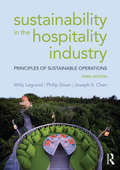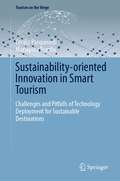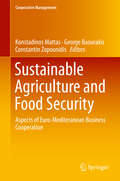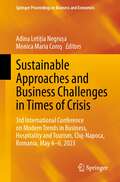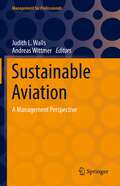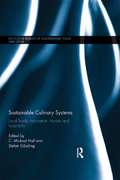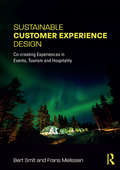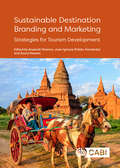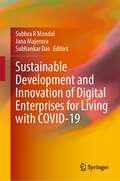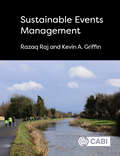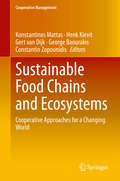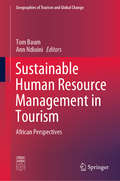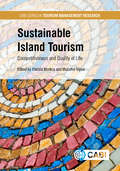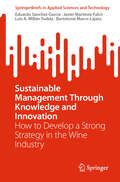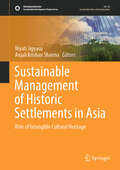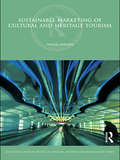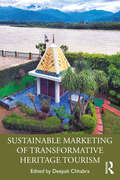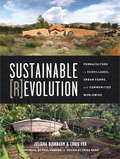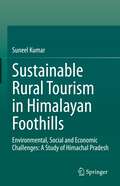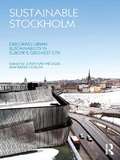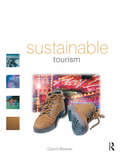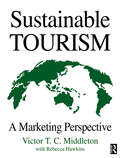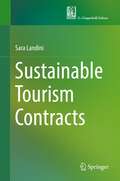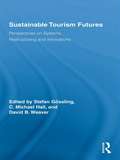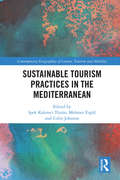- Table View
- List View
Sustainability in the Hospitality Industry: Principles of sustainable operations
by Philip Sloan Joseph S. Chen Willy LegrandSustainability in the Hospitality Industry, Third Edition, is the only book available to introduce students to economic, environmental and socially sustainable issues specifically facing the industry as well as exploring ideas, solutions and strategies of how to manage operations in a sustainable way. Since the second edition of this book, there have been many important developments in this field and this latest edition has been updated in the following ways: Updated content including sustainable food systems, hotel energy solutions, impacts of technology, water and food waste management, green hotel design, certification and ecolabelling systems and the evolving nature of corporate social responsibility strategies. New chapters exploring environmental accounting and the internalization of externalities as well as the management of accessibility in hospitality. Updated and new international case studies with reflective questions throughout to explore key issues and show real-life operational responses to sustainability within the hospitality industry. This accessible and comprehensive account of Sustainability in the Hospitality Industry is essential reading for all students and future managers in the hospitality industry.
Sustainability-oriented Innovation in Smart Tourism: Challenges and Pitfalls of Technology Deployment for Sustainable Destinations (Tourism on the Verge)
by Cecilia Pasquinelli Mariapina TrunfioThis book combines research on technology-driven and social-driven innovation in tourism destinations and the multifaceted concept of sustainability, providing an integrative understanding of the nexus between smartness and sustainability within destinations. It engages theoretically and empirically with the research question of how, and to what extent, smart technologies drive tourism innovation focussed on sustainability. Although innovation and technology are widely considered the way to sustainable tourism growth, further studies need to size the role of technology and critically address modalities, challenges, opportunities and pitfalls of technology deployment in rebalancing tourism disequilibria within local systems. Local, national, and supranational policymakers’ attention to technology investments, the widening technological frontiers, and the enthusiasm for new technological opportunities to build, manage, and market destinations suggest the relevance of this research agenda. This book provides scholars, postgraduate students, and practitioners with conceptual and empirical insights into smart solutions and innovative destination models for multi-stakeholder engagement to manage and address tourism impacts and imbalances. The book outlines scenarios of sustainability-oriented innovation, encompassing and intertwining technological, social, human, and cultural co-drivers as the necessary conditions for smart technologies to enhance sustainable destinations effectively and improve human wellbeing and societal development.
Sustainable Agriculture and Food Security: Aspects Of Euro-mediteranean Business Cooperation (Cooperative Management)
by Constantin Zopounidis Konstadinos Mattas George BaourakisThis book brings together research on cooperative management from the agriculture and food sector. By examining issues from food-policy, trade and environmental perspectives and presenting both methodological and empirical work, it allows readers to develop a deeper understanding of collective management processes and cooperative initiatives, and provides a theoretical background for promoting research in the various sectors in which market communities operate. On a more global level the offers insights into how to building powerful tools for decision making, particularly at a time when agriculture and the economy alike are affected by a volatile political, social and economical environment and are forced to undergo major structural changes.
Sustainable Approaches and Business Challenges in Times of Crisis: 3rd International Conference on Modern Trends in Business, Hospitality and Tourism, Cluj-Napoca, Romania, May 4-6, 2023 (Springer Proceedings in Business and Economics)
by Adina Letiția Negrușa Monica Maria CoroşThis book discusses current trends, challenges, and opportunities in the fields of business, hospitality, and tourism, particularly in Eastern Europe. Featuring selected papers presented at the second annual Modern Trends in Business Hospitality and Tourism International Conference held in Cluj-Napoca, Romania in 2023, the enclosed chapters explore the global marketing environment discussing the latest technological, economic and social-cultural developments. Featuring theoretical and empirical research and real-life case studies, this book explores topics such as global capital markets and investment financing post COVID-19, sustainable business models, financing alternatives for SMEs, corporate governance, human capital leadership, among others. It is appropriate for academics, researchers, scholars and practitioners in the areas of business, hospitality and tourism.
Sustainable Aviation: A Management Perspective (Management for Professionals)
by Andreas Wittmer Judith L. WallsThis book analyses from a management perspective how the aviation industry can achieve a sustainability transformation in order to reach the Paris climate targets for 2050 and provides various strategic and operational recommendations in this regard. It examines various elements of the aviation system exhaustively, including technologies, consumers, airlines, airports and policies, from both short- and long-term standpoints. Specific questions and contradictions, as well as concrete options for taking action, are presented. It also includes numerous practical case studies, which will help practitioners transfer the concepts into their everyday work. The book is aimed at a broad, professional audience consisting of managers, politicians and regulators, but also at advanced students engaged in academic and professional education.
Sustainable Culinary Systems: Local Foods, Innovation, Tourism and Hospitality (Routledge Studies of Gastronomy, Food and Drink)
by Michael Hall Stefan GösslingThere is increasing public and academic interest in local and sustainable foods and food tourism. These interests have been reflected in such diverse elements as the growth of farmers markets, green restaurants, food miles, crabon and sustainability labelling, concerns over food supply and security, Slow Food, Fair Trade, and a desire to buy and 'eat locally'. Food related hospitality and tourism is integral to this process because of the way in which it simultaneously acts to globalise and localise food consumption and create new foodways and commodity chains. This book therefore aims to provide an integrated understanding of the contemporary interest in food and food tourism through the use of an international collection of illustrative case study chapters as well as the provision of a novel integrative framework for the book, a sustainable culinary system. This is the first volume to examine the concept of sustainable culinary systems, particularly with specific reference to tourism and hospitality. Divided into two parts, firstly the notion of the local is explored, reflecting the increased interest in the championing of local food production and consumption. Secondly treatment of sustainability in food and food tourism and hospitality in settings that reach beyond the local in a business and socio-economic sense is reviewed. The book therefore, reflects much of the contemporary public interest in the conscious or ethical consumption and production food, as well as revealing the inherent tensions between local and broader goals in both defining and achieving sustainable culinary systems and the environmental, social and economic implications of food production and consumption. This book provides the reader with an integrated approach to understanding the subject of how culinary systems may be made more sustainable and will be valuable reading to all those interested in sustainable food and food tourism.
Sustainable Customer Experience Design: Co-creating Experiences in Events, Tourism and Hospitality
by Bert Smit Frans MelissenExperiences are an important part of our lives and increasingly represent a crucial topic to address for businesses and professionals. This book focuses on designing, staging and managing experiences within the context of the events, tourism and hospitality industries. It also illustrates current and future developments in these industries and wider society, with an emphasis on sustainable development. The book offers an innovative approach for successfully creating experiences for (potential) customers that is based on combining insights and methods from the world of design and the social sciences. Moreover, it shows how the experience economy and sustainable development both reinforce one another and create challenges that businesses and professionals can address through this approach. Critical thinking questions, practical examples and international case studies are integrated throughout the text. Combining a design science and a social sciences perspective in one inclusive hands-on approach to designing, staging and managing experiences, this is essential reading for all students of Events, Tourism and Hospitality Management, but also related fields.
Sustainable Destination Branding and Marketing: Strategies for Tourism Development
by Azilah Kasim Hugues Seraphin Azizul Hassan Professor Maximiliano Korstanje Kemal Birdir Ali Dalgic Derya Toksöz Andy Heyes Sanjay Nadkarni José Alabau-Montoya María-Eugenia Ruiz-Molina Elson Mankhomwa James Malitoni Chilembwe Victor Ronald Mweiwa Ilke Basarangil Lim Cha Ling Gül Erkol Bayram Moustafa A. Mekawy Perunjodi Naidoo Prabha Ramseook Munhurrun Vishnee Sowamber Hulisi Binbasioglu Ugur Akdu Serap Akdu Jeetesh Kumar Anshul Garg Krishnan Umachandran Hengky Sumisto Halim Yaiza López-Sánchez Sevda Sahilli Birdir Nese Aydin Kevser Çinar Daniel Weiss Ericka Amorim Priyakrushna Mohanty Hemachandran RajamanicamDestination branding and marketing form the backbone of tourism industry growth, but it is increasingly important that the strategies employed consider and promote sustainable solutions. This book provides a comprehensive set of tools and techniques for branding and marketing for sustainable tourism development. It blends tourism and marketing strategies with practical, innovative information technology solutions and a psychological perspective, providing illustrative case studies and examples to aid understanding. Addressing opportunities and challenges across the field, it also reviews how different types of tourism such as community based, accessible, film, agricultural and cultural-heritage tourism entail unique issues for development. Competition between destinations has led to a real need for different strategies in order to differentiate the tourism product. This book: - Uniquely covers both marketing and branding of a destination from a sustainability perspective; - Considers the role of emotions and experiences when advertising a destination; - Brings together a set of global authors to provide a varied and universally applicable approach to the subject. A thought-provoking read for anyone interested in questions of sustainability in destinations, this book provides an invaluable resource for researchers of tourism, marketing and international development studies as well as destination managers.
Sustainable Development and Innovation of Digital Enterprises for Living with COVID-19
by Subhankar Das Subhra R Mondal Jana MajerovaThis book explores the implications of descriptive, predictive, and prescriptive digital enterprises and their practices for different functional domains and in different counties during COVID-19. This book will bring new dimensions of study to the concept of digital enterprises which is sure to change after COVID-19 as it has upended the way in which people work, live and communicate. Covering a broad range of topics related to digital enterprises, this book is meant for business owners, digital professionals, managers, researchers, and academics who are seeking to integrate digital enterprises in order to allow organizations and countries to stay on a sustainable development trajectory while living with COVID-19.
Sustainable Events Management
by Kevin Griffin Dr Razaq RajThis book introduces the reader to sustainable events management theory and practice, based on academic research and illustrated with empirical case studies. The book provides a comprehensive view of sustainable management and how it relates to the many sectors within the events industry. It emphasises the fundamental importance of local communities, businesses and stakeholders to events organisation in regional, national and international locations. It brings into focus international governing bodies, and national government strategic objectives as the corner stones for sustainable development in the events sector. The relationship between strategic objectives and on-the-ground operational responsibilities are presented using research by contributing authors and accredited organisations to add scope and depth. Best-practice case studies are used throughout the book to highlight and explain particular sustainable management issues and practices. The scope of the book is international and designed to educate undergraduate and postgraduate students and to support practitioners in their operational and administrative duties within their industry sectors.
Sustainable Food Chains and Ecosystems: Cooperative Approaches for a Changing World (Cooperative Management)
by Constantin Zopounidis George Baourakis Gert Van Dijk Konstantinos Mattas Henk KievitUnarguably, preserving the ecosystem, securing sustainability and understanding the dynamics of agro-food chains have all become vital policy objectives with several interlinked dimensions. The main objectives of this book are to draw the attention of researchers, policymakers and businesspeople to the relation between agro-food chains and the ecosystem, and to demonstrate the importance of building resilient agro-food chains that take into account climate change and environmental challenges. Agro-food chains as they function today can serve as powerful tools for promoting sustainable forms of agriculture, consumption and production that are embedded in a viable ecosystem. The book addresses a range of environmental, methodological and societal issues from a transaction perspective, while also providing extensive background information on the topic, and outlining future applications and research directions.
Sustainable Human Resource Management in Tourism: African Perspectives (Geographies of Tourism and Global Change)
by Tom Baum Ann NdiuiniThis book addresses the application of sustainable HRM principles within tourism in the specific context of Africa, a neglected area of study. It draws on diverse aspects of HRM, from the micro- (individual) through the meso-level (organisational) to the macro-level (policy, governmental). It also reflects the diverse challenges facing a critical area within emerging African tourism, that of its workforce. The book is substantially research-based and provides a state-of-the-art picture of emergent studies in this area, drawing on case examples from a wide-range of African contexts. As such, it provides a comprehensive resource and starts discussion in an emergent research area.
Sustainable Island Tourism: Competitiveness and Quality of Life (CABI Series in Tourism Management Research)
by Louise Twining-Ward Jack Carlsen Haywantee Ramkissoon Robertico Croes Professor Levent Altinay Deborah Kerstetter Professor Kelly Bricker Maria Maria Allan S Allan S Elisa Elisa Gyumin Gyumin Dr Anna Farmaki Dr Muhammet Yasarata Meghan Beardsley Dr Marketa Kubickova Mariyam ZulfaTourism continues to grow, and as the industry develops, it is important for researchers and practitioners to fully understand and examine issues such as sustainability, competiveness, and stakeholder quality of life in tourism centres around the world. Focusing on the unique perspective of island tourism destinations, this book outlines impacts on, and potential strategies for protecting, the natural environment, local economy, and local culture. Presenting an interdisciplinary integrated approach, this important collection of new research: - Is the first book to provide coverage on sustainable tourism best practice in island destinations; - Focuses on the unique perspective of islands as destinations, exploring the interplays of competitiveness and quality of life; - Includes a portfolio of conceptual, empirical, and case-based studies written by international experts to give a balanced and comprehensive view. A timely and important read for researchers, students and practitioners of tourism, this book also provides a valuable resource for researchers of sustainability and environmental science.
Sustainable Management Through Knowledge and Innovation: How to Develop a Strong Strategy in the Wine Industry (SpringerBriefs in Applied Sciences and Technology)
by Javier Martínez-Falcó Bartolomé Marco-Lajara Eduardo Sánchez-García Luis A. Millán-TudelaThis book explores multiple types of innovation within the modern wine industry and how it has developed historically. The book provides and extensive examination of the existing knowledge in this subject. This highlights the evolution of historical and contemporary trends and signposts the authoritative literature published and most important researchers active in the field. With this comprehensive approach, the book is a versatile resource for both scholars and industry professionals, akin to a "Swiss Army Knife" for all aspects of green innovation in the wine sector.
Sustainable Management of Historic Settlements in Asia: Role of Intangible Cultural Heritage (Sustainable Development Goals Series)
by Anjali Krishan Sharma Niyati JigyasuThe book addresses the contribution of Intangible Cultural Heritage to the sustainable management of historic cities and towns. Through the unique, diverse, and dynamic illustrations from Asia, it provides insights into the interrelationships of intangible and tangible cultural attributes and their significance on the sustainability of these areas. Historic cities and towns, large and small, along with their natural and man-made environments have a distinct identity and embody the values of traditional urban cultures. Evolved by tangible built forms and intangible elements, as cultural practices and expressions- meanings and values attributed to them, they are in a state of continuous change. The built environment acts as a ‘place’ or a ‘site’ where most of these expressions are shaped. These areas are significant for their social cohesion and economic stronghold that dates back over generations and centuries. Over the years, there have been many theoretical discussions about the interrelationships of tangible and intangible but is challenging to manage in practice, especially in historic urban areas. There is a lack of understanding of the complexity and pervasiveness of intangible values and their direct relationship with the physical structure of the town/city. This book strives to address the various challenges, emphasising the intricate relationships between the tangible and intangible aspects of historic cities in the Asian context.
Sustainable Marketing of Cultural and Heritage Tourism (Routledge Critical Studies in Tourism, Business and Management)
by Deepak ChhabraCultural attractions play an important role in tourism at all levels, and attract huge numbers of tourists interested in heritage and the arts. Cultural Heritage Tourism has positive economic and social impacts but can also have negative impacts on communities and regions. This book draws together and links ideas of tourism from sustainable marketing perspectives and embeds it within a heritage management setting. Through a discussion and analysis of existing literature and practices this book aims to propose a marketing strategy framework grounded in sustainable principles that can be used to sustain and preserve the authenticity of cultural heritage for future generations, whilst appealing to the suppliers, the regulators, and the consumers. The book first explains the dynamics of cultural heritage with its authenticity underpinnings, marketing, and tourism, and proposes a strategic praxis drawn from core sustainable principles. This is followed by a pragmatic examination of the proposed framework from the shaper’s (provider’s) perspective. The material presented in this book is not merely an agglomeration of documented secondary research, but the theoretical concepts are grounded in empirical research and interactive discussions with students and the travel and tourism industry. A variety of heritage institutions across the globe are used as starting points to test the applicability of the proposed paradigm: these include museums, historic house museums, heritage hotels/resorts, festivals, and heritage merchandize. This is a timely offering to a growing and vibrant area of research; what is most pertinent is that it is a thorough and fresh take on the topic with primary research included. It will find a place in student materials for a variety of courses and it should be read by practicing academics and researchers.
Sustainable Marketing of Transformative Heritage Tourism
by Deepak ChhabraThis book proposes that sustainable marketing should be founded on a higher level of consciousness, governed by the Eastern ethical principles of dharma and karma. It suggests a socially responsible, integrated marketing strategy to boost transformational heritage tourism.The book puts forward a framework to promote and inspire transformative heritage tourism from a sustainable marketing perspective. Drawing on examples from different parts of the world such as Thailand, China, the USA, India, Australia, the United Kingdom, Spain, and Hong Kong, it takes a unique approach by integrating elements associated with distributive justice, procedural justice, morally motivated existentialist authentic experiences and the well-being of visited and visiting environments. The book pivots on the planning and marketing of heritage of communities such as local, descendent and indigenous across eight broad themes: (1) promotion and sustainable branding of heritage tourism; (2) empowerment of indigenous communities; (3) authenticity and conservation of heritage; (4) safeguarding of art, culture and cultural landscapes; (5) economic viability for the host communities; (6) interpretation and resolution of dissonant heritage representations; (7) stimulating audience engagement and co-created mindful spaces and; (8) facilitating moral consciousness and stimulating lasting inner transformation in guests and hosts. Scholars can replicate and/or test the proposed guided sustainable marketing model, referred to as the transformative heritage tourism pathway, which is adapted from a) the needs, activities and well-being sequential path of transformation and, b) the socially responsible sustainable marketing doctrine guided by the principles of 'dharma' and 'karma'. This book is unique as it stresses eudaimonia as the ultimate goal of well-being and argues that its pursuit can steer the sustained transformation route toward a higher sense of consciousness and responsible production and consumption of heritage resources.In summary, this book contributes toward advancing the dialogue on sustainable marketing and transformative heritage tourism. It will appeal to researchers, undergraduates and practitioners interested in sustainable marketing, transformative heritage tourism and social, ecological, cultural and economic welfare of visited and visiting destinations.
Sustainable Revolution
by Paul Hawken Louis Fox Juliana Birnbaum Erika RandUrban gardeners. Native seed-saving collectives. Ecovillage developments. What is the connection between these seemingly disparate groups? The ecological design system of permaculture is the common thread that weaves them into a powerful, potentially revolutionary--or reevolutionary--movement. Permaculture is a philosophy based on common ethics of sustainable cultures throughout history that have designed settlements according to nature's patterns and lived within its bounds. As a movement that has been building momentum for the past 40 years, it now is taking form as a growing network of sites developed with the intention of regenerating local ecologies and economies. Permaculture strategies can be used by individuals, groups, or nations to address basic human needs such as food, water, energy, and housing. As a species, humans are being called forth to evolve, using our collective intelligence to meet the challenges of the future. Yet if we are to survive our collective planetary crisis, we need to revisit history, integrating successful systems from sustainable cultures. To boldly confront our position on the brink of the earth's carrying capacity and make changes that incorporate the wisdom of the past is truly revolutionary. Sustainable Revolution features the work of a worldwide network of visionaries, including journalists, activists, indigenous leaders and permaculturists such as David Holmgren, Vandana Shiva, Charles Eisenstein, Starhawk, Erik Assadourian, Victoria Tauli-Corpuz, Albert Bates, and Geoff Lawton. This beautifully photographed collection of profiles, interviews, and essays features 60 innovative community-based projects in diverse climates across the planet. Edited by anthropologist Juliana Birnbaum Fox and award-winning activist filmmaker Louis Fox, it can be read as an informal ethnography of an international culture that is modeling solutions on the cutting edge of social and environmental change. The research presented in the book frames the permaculture movement as a significant ally to marginalized groups, such as the urban poor and native communities resisting the pressures of globalization. Sustainable Revolution uplifts and inspires with its amazing array of dynamic activists and thriving, vibrant communities.From the Trade Paperback edition.
Sustainable Rural Tourism in Himalayan Foothills: Environmental, Social and Economic Challenges: A Study of Himachal Pradesh
by Suneel KumarThis book discusses the development of the rural tourism industry in the Himalayan region, specifically in the region of Himachal Pradesh (HP), from the perspective of different stakeholders in the tourism industry. It examines the current status and trends of rural tourism in HP, discusses the challenges faced in response to the vulnerability of the Himalayas to global climate change, and evaluates the consequences of rural tourism on the socio-economic structure in HP to sustainably formulate a framework for promoting financial and social inclusion. This framework covers flexible strategies for planning rural tourism development, assesses the role of technology in the tourism industry in achieving the objective of social and financial inclusion, and identifies the factors influencing a tourist’s decision to undertake rural tourism and develop a hierarchical relationship among those factors. The book will be of interest to students and researchers of sustainable rural tourism and tourism economics, as well as stakeholders from various sectors aiming to sustainably improve the ecological and economic fragility of the Himalayas due to climate change.
Sustainable Stockholm: Exploring Urban Sustainability in Europe’s Greenest City
by Jonathan Metzger Amy Rader OlssonSustainable Stockholm provides a historical overview of Stockholm’s environmental development, and also discusses a number of cross-disciplinary themes presenting the urban sustainability work behind Stockholm’s unique position, and importantly the question of how well Stockholm’s practices can be exported and transposed to other places and contexts. By using the case of Stockholm as the pivot of discussions, Sustainable Stockholm investigates the core issues of sustainable urban environmental development and planning, in all their entanglements. The book shows how intersecting fields such as urban planning and architecture, traffic planning, land-use regulation, building, waste management, regional development, water management, infrastructure engineering—together and in combination—have contributed to making Stockholm Europe’s "greenest" city.
Sustainable Tourism
by David WeaverSustainable Tourism comprehensively examines the theoretical and applied dimensions of contemporary sustainable tourism from a global perspective. Using international case studies and examples, it provides cutting edge coverage of the latest developments in the area, both theoretically and practically. It takes the reader through all aspects of sustainable tourism from the emergence of the paradigm to sustainability issues in all types of tourism and all components of the industry. Divided into 11 chapters it covers* ?Alternative tourism? (AT), or small-scale tourism and its associated pros and cons* Sustainable tourism within the conventional ?mass? tourism sector: the ?green consumer?, transportation, accommodation, attractions and tour operator considering issues and developments in quality control* Destination sustainability: issues of community empowerment and ideal sustainability models* Conclusions for the future of sustainable tourismThe wide variety of international case studies used include: backpacking in Australia and Spain, Volunteer tourism in the US, Six Continents and Marriott hotels, Disney World, the Grand Prix, the Grand Canyon, mountain gorilla parks in Uganda and many more.Specifically written for courses in the specific topic area of sustainable tourism, this textbook considers the needs of both students and lecturers as follows:* Ideal for a semester course (or a 42-hour course)* Global perspective throughout the chapters and in the breadth of illustrative boxed case studies;* Chapters exceptionally well-integrated through frequent cross-references* End-of-chapter questions that prompt deeper integrative thinking on the part of the reader.* Online resources for the lecturer, including PowerPoint presentations and multiple choice exercises
Sustainable Tourism
by Rebecca Hawkins Victor T.C. MiddletonLooking ahead to the 21st century, Sustainable Tourism explains the current thinking process that underlies the emerging international principles of more sustainable development in travel and tourism. Using international illustrations it draws on experience and good practice as they are being increasingly applied around the world in the late 1990s. In sharp contrast to the problem analysis approach adopted by so many authors to this subject, this book is focused on the pro-active role the private sector industry can play in partnership with the public sector to achieve solutions through its day-to-day operations and marketing, expecially in product enhancement and quality controls.Case material, contributed by senior professionals in the industry, include:*Kruger National Park, South Africa *Quicksilver Connections, Barrier Reef, Australia *Edinburgh's Old Town, UK *Ironbridge Gorge Museum, UK *Rutland Water, UK.Industry illustrations are drawn from British Airways, Grecotel, Inter-Continental Hotels and Resorts, the International Federation of Tour Operators, P&O and TUI.Professor Victor Middleton has had some thirty years' international experience of marketing practice covering most of the private and public sectors of travel and tourism. He holds appointments as Visiting Professor at Oxford Brookes University and University of Central Lancashire.Dr Rebecca Hawkins runs her own business specialising in environmental aspects of tourism projects and has undertaken a number of pioneering programmes in this role. She was Deputy Director of the World Travel and Tourism Environment Research Centre at Oxford Brookes University, where she worked with Victor Middleton.
Sustainable Tourism Contracts
by Sara LandiniThis book addresses the various sustainability issues that the tourism industry has faced over time like the trend from over-tourism to under-tourism or from tourism in increasingly distant destinations to a new local tourism with new needs. It also highlights how contracts, both between businesses and those with consumers, can represent tools for the financial, ecological and social sustainability of the tourism industry.
Sustainable Tourism Futures: Perspectives on Systems, Restructuring and Innovations (Routledge Advances in Tourism)
by C. Michael Hall Stefan Gössling David WeaverA global industry and an important tool for economic development, international tourism is facing an increasingly uncertain future. Global environmental change, including climate change; increasing fuel prices; and growing criticism from environmental and social interest groups are posing substantial challenges to the belief that international tourism can be sustainable at current rates and patterns of growth. This book therefore aims to answer the questions of if and how tourism can be a sustainable industry. The book concludes that sustainable tourism is possible but that it requires fundamental shifts in operations, systems and philosophies. The various contributions identify a number of means by which this can be accomplished but stress that sustainable tourism still has a long way to travel before it can reach its destination.
Sustainable Tourism Practices in the Mediterranean (Contemporary Geographies of Leisure, Tourism and Mobility)
by Colin Johnson Ipek Kalemci Tüzün Mehmet ErgülSustainable Tourism Practices in the Mediterranean showcases and examines the current and future trends in sustainable tourism in this popular region where tourism is one of the leading determinants of economic development. This volume examines the effects of specific recent events including terrorism, financial crises and various political changes in the Mediterranean region. Looking at a range of destinations, island and mainland, urban and rural, summer and winter and emergent and declining zones, it provides a comprehensive overview of this area. It also draws on a number of wide-ranging themes such as gastronomy, (corporate) social responsibility, entrepreneurship, ethical issues, service quality, health and the slow city, offering an insightful study of the challenges the Mediterranean region faces and the sustainable practices that can be implemented in order to overcome them. Written by leading academics in the field, this book will be of great interest to upper-level students, researchers and academics in Tourism, Development Studies and Geography.
